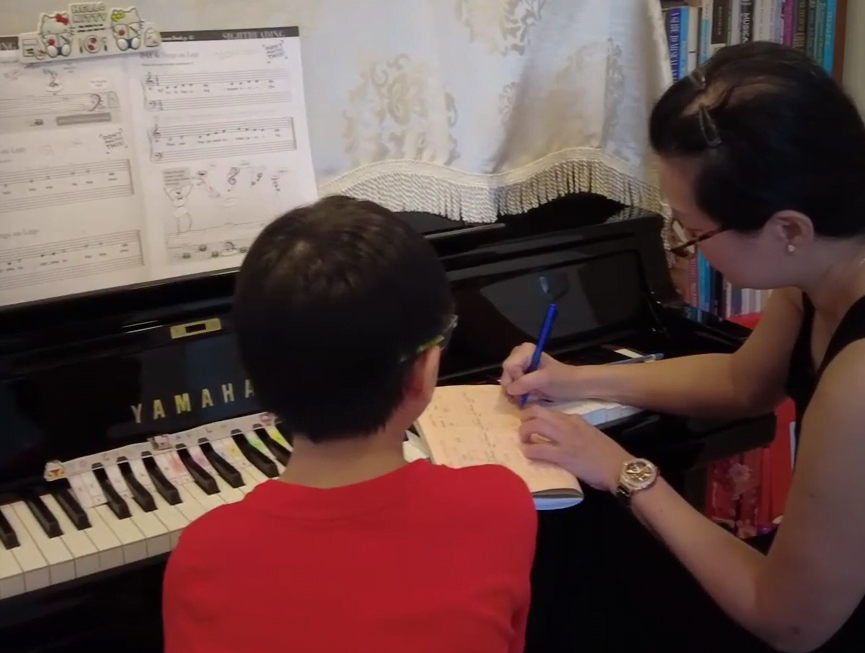As a piano teacher who’s spent years honing my skills, I’ve come to realize that piano teaching and learning piano are not just about passing on knowledge; it’s an ongoing journey of learning, growth, and, ultimately, success—for both you and your students. Teaching piano at a professional level requires a constant commitment to improvement. If you want to refine your teaching techniques and truly make a difference in your students’ lives, it’s essential to focus on areas like technique, repertoire, and performance preparation. This article will guide you through advanced methods that can help you fine-tune your skills and open up new professional opportunities.
Understanding Your Students
As a piano teacher, understanding your students’ needs, goals, and learning styles is crucial for effective teaching. Each student is unique, and what works for one may not work for another. By taking the time to understand your students, you can tailor your teaching approach to meet their individual needs, ensuring they receive the best possible instruction.
Consider the following aspects to better understand your students:
- Musical Background and Experience: Knowing your students’ previous musical experience helps you gauge their starting point and build on their existing knowledge.
- Learning Style and Preferences: Some students may prefer visual aids, while others might benefit from auditory or kinesthetic learning methods. Identifying their preferred learning style can make your lessons more effective.
- Goals and Motivations: Understanding why your students want to learn piano and what they hope to achieve can help you tailor your lessons to keep them motivated and focused.
- Strengths and Weaknesses: Identifying areas where your students excel and where they struggle allows you to create a balanced learning plan that addresses their specific needs.
- Personality and Temperament: Each student has a unique personality and temperament. Being aware of these traits can help you build a rapport and create a comfortable learning environment.
By understanding your students, you can create a personalized learning plan that addresses their specific needs and helps them achieve their goals. This approach not only enhances the learning experience but also fosters a deeper connection between you and your students, making you such a great teacher.

Refining Piano Technique for Professional Musicians
One of the greatest challenges in piano teaching is mastering advanced techniques. When I first started working with professional musicians, I realized quickly that simply knowing how to play wasn’t enough. I needed to teach in a way that helped these musicians go beyond what they already knew, helping them break through technical barriers.
Many advanced piano courses emphasize the importance of mastering these techniques to achieve professional success.
A few years ago, I worked with a talented young pianist who struggled with complex left-hand techniques. We spent months refining his approach, working on exercises that focused on specific muscle memory and hand positioning. The transformation in his playing was remarkable. This is where exercises tailored to high-level musicians can make all the difference. If you’re looking to fine-tune your own teaching methods, start by incorporating professional feedback into your lessons and build on advanced techniques like these.
For more tips on improving technique, explore our private piano lessons, designed specifically for experienced musicians.
Expanding Your Piano Repertoire for High-Profile Gigs
If you’re teaching professional musicians, expanding their piano repertoire is essential. Advanced music students often face challenges in finding new pieces that stretch their abilities while remaining suitable for their performance style. By selecting diverse and challenging compositions, you can help your students open doors to new professional opportunities.
I vividly remember working with a professional jazz pianist who was stuck in a creative rut. By pushing him to learn new classical and contemporary pieces, we expanded his repertoire and transformed his career. He was suddenly getting offers for more high-profile gigs, and the sense of accomplishment he felt was incredible.
Explore our piano classes in Singapore to find lessons that help you curate the right repertoire for your students.
Preparing Your Piano Students for Auditions and Performances
Preparing your students for high-pressure auditions and performances is one of the most rewarding aspects of piano teaching. Yet, it’s also one of the most demanding. Every student is unique in how they deal with the stress and expectations of auditions, but with the right preparation, they can walk into any performance with confidence.
In addition to auditions, preparing for piano exams is another critical aspect where students need focused guidance and support.
One of my most memorable experiences was coaching a student through her audition for a prestigious music conservatory. We worked intensively, refining her technique and preparing her mentally for the big day. When she called me after the audition, almost in tears, saying she had never played so well under pressure, it reminded me why I love teaching at this level.
Make sure you tailor your lessons to meet the specific needs of the auditions or gigs your students are aiming for. These tailored lesson plans are often what set top piano teachers apart.
Find more about audition prep in our piano lessons for kids, where we focus on building confidence and refining skills.
Advanced Techniques to Improve Piano Student Performance
Sometimes, the most talented students hit a wall, unable to reach their next level of performance. That’s where advanced teaching techniques come in. I’ve found that pushing students through difficult pieces or techniques often involves innovative methods of teaching.
Private piano teachers often employ innovative methods to help students overcome these challenges and reach their full potential.
A few years ago, I worked with an exceptionally talented teenage student who couldn’t master one particularly challenging piece for an upcoming concert. We tried something unexpected—breaking the piece into smaller, more digestible sections and tackling them with different techniques. The result? Not only did he nail the piece, but he performed it with such emotion that it left the audience speechless.
Teaching students to push past their limits is crucial in getting them to achieve their full potential. For more advanced techniques, check out our piano teacher near me to refine your own methods and guide your students to success.

Qualities of a Successful Piano Teacher
A successful piano teacher possesses certain qualities that enable them to effectively teach and inspire their students. Here are some key attributes that can help you become a more effective and inspiring piano teacher:
- Patience and Empathy: Teaching piano requires a great deal of patience. Students may struggle with certain concepts or techniques, and it’s important to be understanding and empathetic. By showing patience and empathy, you can create a supportive learning environment where students feel comfortable making mistakes and learning from them.
- Strong Communication Skills: Clear and effective communication is essential in teaching piano. Being able to explain complex concepts and techniques in a way that students can understand is crucial. Good communication also involves active listening, allowing you to address your students’ concerns and questions effectively.
- Flexibility and Adaptability: Every student is different, and a one-size-fits-all approach doesn’t work in piano teaching. Being flexible and adaptable in your teaching methods allows you to meet the diverse needs of your students. Whether it’s adjusting your lesson plan or trying new teaching techniques, adaptability is key to successful teaching.
- Passion for Music: A genuine love for music and a passion for teaching are essential qualities for a piano teacher. Your enthusiasm for music can be contagious, inspiring your students to develop their own love for the instrument.
- Continuous Learning: The world of music is constantly evolving, and staying up-to-date with the latest teaching methods and techniques is important. A successful piano teacher is always learning, whether it’s through attending workshops, taking courses, or simply exploring new music.
By embodying these qualities, you can create a positive and supportive learning environment that fosters growth and development in your students. Your dedication to teaching piano will not only help your students succeed but also establish you as a great teacher in the field.
Technology and Resources for Piano Lessons
In today’s digital age, incorporating technology and various resources into your piano lessons can significantly enhance the learning experience. Here are some tools and resources that can make your piano lessons more engaging and effective:
- Digital Keyboards and Pianos: Modern digital keyboards and pianos come with a range of features that can aid in teaching and learning. From built-in metronomes to recording capabilities, these instruments offer tools that can help students practice more effectively and track their progress.
- Music Software and Apps: There are numerous software programs and apps available that can assist in teaching piano. These tools can help students learn music theory, practice techniques, and access a wide range of musical resources. Apps like Simply Piano, Flowkey, and Piano Marvel offer interactive lessons and exercises that can complement your teaching.
- Online Resources: The internet is a treasure trove of resources for piano teachers and students. Websites like YouTube offer video lessons and tutorials on various aspects of piano playing. Online courses and forums can also provide valuable insights and tips for both teachers and students.
- Audio and Video Recording Tools: Recording students’ performances can be a valuable tool for tracking progress and identifying areas for improvement. Audio and video recordings allow students to review their performances and receive constructive feedback. These recordings can also serve as a motivational tool, showing students how much they have improved over time.
By incorporating technology and resources into your piano lessons, you can create a more engaging and effective learning environment. These tools not only enhance the learning experience but also provide students with additional resources to practice and improve their skills outside of lessons.
Student Progress and Feedback
Regular feedback and progress assessments are essential components of effective piano lessons. They help students track their progress, stay motivated, and focus on their goals. Here are some ways to provide feedback and assess student progress:
- Regular Progress Reports: Providing regular progress reports helps students and parents stay informed about the student’s development. These reports can highlight achievements, areas for improvement, and set goals for future lessons.
- Audio and Video Recordings: Recording students’ performances can be a powerful tool for tracking progress. These recordings allow students to hear and see their own playing, helping them identify areas for improvement. Reviewing these recordings with your students can provide valuable insights and constructive feedback.
- Practice Assignments: Assigning regular practice exercises and tasks helps students stay focused and motivated. These assignments should be tailored to each student’s needs and goals, providing them with specific areas to work on between lessons.
- Performance Opportunities: Providing regular performance opportunities, such as recitals or informal performances, helps students build confidence and stage presence. These opportunities allow students to showcase their progress and receive feedback from a live audience.
By providing regular feedback and progress assessments, you can help your students stay motivated and focused on their goals. This approach not only enhances their learning experience but also fosters a sense of accomplishment and growth.

Creating a Positive Learning Environment
Creating a positive learning environment is essential for effective piano teaching. A supportive and encouraging atmosphere can significantly impact a student’s motivation and enjoyment of learning. Here are some ways to create a positive learning environment:
- Establishing a Comfortable and Relaxed Atmosphere: A comfortable and relaxed atmosphere helps students feel at ease and focused. Ensure that your teaching space is welcoming and free from distractions. A positive physical environment can make a big difference in a student’s ability to concentrate and enjoy their lessons.
- Encouraging Open Communication: Open communication is key to building a strong teacher-student relationship. Encourage your students to ask questions, express their concerns, and share their thoughts. Being approachable and responsive helps students feel comfortable seeking help and clarifying doubts.
- Setting Clear Goals and Expectations: Setting clear goals and expectations helps students stay focused and motivated. Clearly communicate what you expect from your students and what they can expect from you. Establishing short-term and long-term goals can provide a sense of direction and purpose.
- Providing Positive Reinforcement: Positive reinforcement and encouragement are powerful motivators. Celebrate your students’ achievements, no matter how small, and provide constructive feedback. Positive reinforcement helps build confidence and self-esteem, making students more likely to persevere through challenges.
By creating a positive learning environment, you can help your students feel comfortable, motivated, and inspired to learn. A supportive atmosphere not only enhances the learning experience but also fosters a love for music and a lifelong passion for playing the piano.
Marketing Your Advanced Piano Lessons to Professionals
Finally, once you’ve honed your teaching skills and techniques, it’s time to market yourself to professional musicians. I learned this the hard way—early in my career, I focused so much on the teaching side that I forgot the importance of marketing my services to the right audience.
Building a portfolio of success stories, collecting testimonials from former students, and utilizing social proof are strategies that successful music teachers use to attract more advanced students who are serious about their craft. Today, most of my students are either performing professionally or preparing for it.
If you want to position yourself as the go-to teacher for professionals, visit our Singapore piano teacher page for more insights on how to market effectively.
Conclusion
As a piano teacher, your ability to help students reach their highest potential is a reflection of your dedication to improving your own skills. Whether it’s refining advanced techniques, expanding repertoire, or preparing students for auditions, each step in your teaching journey will lead you closer to professional success. Keep pushing the limits of your craft, and remember that your growth as you teach piano directly impacts your students’ success.
For more insights, check out our piano teacher Singapore page and start fine-tuning your teaching skills today.




